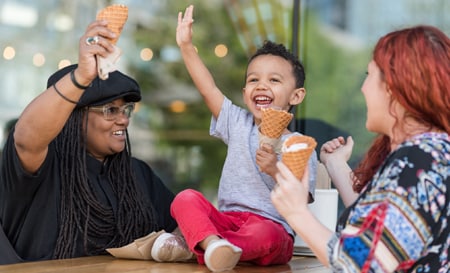How to Use Rewards

Behaviors are more likely to happen again when followed by a positive consequence like a reward. This is true for all behaviors, even those you don’t want to happen again. Rewards are important for many reasons:
Rewards can encourage your child’s good behaviors.
The way you respond right after your child’s behaviors makes the behavior more or less likely to happen again. Rewards can help get your child to do more of the things you want her to do. Rewards that happen right after a behavior are best.
Rewards can help increase self-esteem.
Toddlers and preschoolers hear the words “no,”, “stop,” and “quit” many times during the day. This is normal and one of the ways they learn right from wrong. But when children hear these things over and over, their self-esteem can begin to suffer. They may begin to believe they cannot do anything correctly. When a child earns a reward, he knows he has done something good and something you like.
Rewards can improve your relationship with your child.
When you give a reward to your child, you and your child are both happy. You are happy because your child has done something you like. Your child is also happy because she is getting something she likes.
Types of Rewards
There are several types of rewards. Material rewards include toys, candy, or other things that cost money. Another type of reward is a social reward. Social rewards are cheap or free and can be even more powerful than material rewards. They also can be given more often and immediately after behaviors you like.
Examples of Social Rewards
- Affection – includes hugs, kisses, a high five, a smile, a pat on the back, or an arm around the shoulder.
-
Praise – Praise happens when parents say things like “Great job,” “Way to go,” or “Good boy/girl.” However, specific (or labeled) praise tells a child exactly what behavior you liked. Examples of labeled praise are:
- “Great job playing quietly while I was on the telephone!”
- “You were a great helper when you put all your toys in the closet today!”
- Attention and Activities –Extra time with you or a special activity can be a powerful reward for young children. Some examples include playing a favorite game, reading a story, and helping with dinner. Other activities like going to the movies or the zoo can also be used, but these activities may not always be available or affordable.
Reward Programs
A rewards program is a way to keep track of how often your child does what you like. You watch your child’s behavior and when you catch him doing what you like, you provide a reward. For young children, a chart is often used.